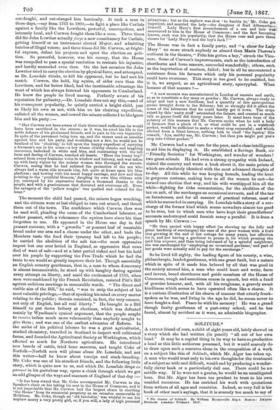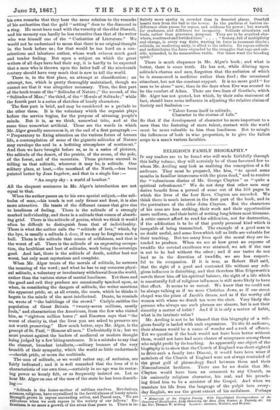SOLITUDE.*
A LITTLE friend of ours, a child of eight years old, lately showed us• a story which she had written (in pencil) " all out of her own head." It may be a capital thing in its way to have so productive a head as this little authoress possessed, but it would scarcely do. to draw upon such a resource alone in the composition of a work on a subject like this of Solitude, which Mr. Alger has taken up. A man who would trust only to his own thoughts for the treatment. of a subject so wide and difficult, would end by producing a wonder- fully clever book or a particularly dull one. There could be no• middle way. If he were not a genius, he would be an unmitigated bore. But Mr. Alger has been too prudent to trust to his own unaided resources. He has enriched his work with quotations. from writers of all ages and countries. Indeed, so very full is his book of other men's sayings, that it is scarcely too much to say of • The Genius of Solitude. By William Rounseville Alger. Beam: Roberts Brothers. Loudon: Trtibuer. 1857.
his own remarks that they bear the same relation to the remarks of his authorities that the gold " setting" does to the diamond in a ring. He must have read with the voracity of the elder Disraeli, and his memory can hardly be less retentive than that of the writer who was himself one of the " Curiosities of Literature." We would not be understood to mean that there is no original thought in the book before us ; for that would be too hard on a con- scientious and laborious author, whose work evinces much good and tender feeling. But upon a subject on which the great writers of all days have had their say, it is hardly to be expected that a man who is thrown upon the latter half of the nineteenth century should have very much that is new to tell the world.
There is, in the first place, an attempt at classification ; an attempt, too, which is pretty thoroughly maintained, though we -cannot see that it was altogether necessary. Thus, the first part of the book treats of the " Solitudes of Nature ;" the second, of the "Solitudes of Man ;" the third, of the " Morals of Solitude ;" while the fourth part is a series of sketches of lonely characters.
The first part is brief, and may be considered as a prelude to the other three. It is the voluntary which the organist plays before the service begins, for the purpose of attuning people's minds. But it is, as we think, somewhat trite, and at the same time somewhat artificial. These are the words in which Mr. Alger grandly announces it, at the end of a first paragraph
:- 4' Preparatory to fixing attention on the various forms of human life, a contemplation of some of the gigantic solitudes of Nature may envelope the soul in a befitting atmosphere of sentiment." And then we have brought before us, as in a series of pictures, the solitude of the desert, of the prairie, of the ocean, of the pole, .of the forest, and of the mountain. These pictures succeed in telling us that solitude, wherever it may be, is solitude. One solitary place, at least,—the moorland of the North,—has been painted better by Jean Ingelow, and that in a single line :—
" An empty sky : a world of heather."
All the eloquent sentences in Mr. Alger's introduction are not equal to that.
When the author passes on to his own special subject,—the soli-
tudes of man,—his touch is not only firmer and finer, it is also more attractive. He treats of the different causes that give rise to loneliness of feeling. There is the solitude of a strongly marked individuality, and there is a solitude that comes of absorb- ing`grief. There is the solitude of genius, which we think it would often be difficult to distinguish from that of individuality. There is what the author calls the " solitude of love," which, by the bye, is usually a solitude a deux, if we may be forgiven such a bull. There is the solitude that comes of selfishness, and that is the worst of all. There is the solitude of an engrossing occupa- tion, the healthiest and best of solitudes, work being the sovereign good. And last, there is the solitude of death, neither best nor worst, but only most mysterious and complete.
When Mr. Alger treats of the morals of solitude, he narrows
the meaning of the word ; and what he has to say concerns physi- cal solitude, a voluntary or involuntary withdrawal from the world, rather than the various states of mental loneliness. Yet these and the good and evil they produce are occasionally touched upon, as when, in considering the dangers of solitude, the writer mentions the apparent pride, or, at all events, the scorn, which he thinks it begets in the minds of the most intellectual. Dante, he reminds us, wrote of "'the babblings of the crowd." Carlyle entitles the population of Great Britain " twenty-seven millions, mostly fools," and characterizes the Americans, from the few who visited him, as " eighteen million bores ;" and Emerson says that " the worst of charity is, that the lives you are asked to preserve are not worth preserving." How much better, says Mr. Alger, is the precept of St. Paul, " Honour all men." Undoubtedly it is ; but we must protest against the leaders of mediaeval or modern thought being judged by a few biting sentences. It is a mistake to say that the clearest, broadest intellects,—solitary because of the very breadth of their sympathy, which the world so little understands —cherish pride, or scorn the multitude.
The uses of solitude, or we would rather say, of seclusion, are
Tairly indicated ; and it is well remarked that the love of it is characteristic of our own time,—certainly in no age was its restor- ing power so keenly felt, or so frequently insisted on. Let us hear Mr. Alger on one of the uses of the state he has been describ- ing :- "Solitude is the foster-mother of sublime resolves. Revolutions, sciences, religions, have crystallized in the fervid silence of lonely minds. Strength grows in repose succeeding action, and Pascal says, ' We are ridiculous when we seek repose in the society of our fellows.' En- thusiasm is no more a growth of the arena than peace is. There is in- finitely more apathy in crowded than in deserted places. Overfull hearts turn from the ball to the bower. In the purlieus of fashion in- difference often passes for repose, and coldness for power ; but warmth for crudeness, and diffidence for incapacity. Solitude stimulates and feeds, rather than generates, purposes. They are to be acquired else- where, confirmed and fortified hero." . . . . " Society, full of multiplicity and change, is every way finite, wasting its force in incessant throbs ; solitude, an unaltering unity, is allied to the infinite. Its repose collects and redistributes the force expended by the struggles that rage and sub- side, unheeded, in its measureless realm. Our times want the brooding spirit."
There is much eloquence in Mr. Alger's book ; and what is better, there is some truth. He has not, while dilating upon solitude's charms and uses, forgotten that the seclusion of which he is enamoured is medicine rather than food ; the occasional stimulant, but not the constant support. It is no more godd " for man to be alone" now, than in the days when Eve was created to be the comfort of Adam. There are two lines of Goethe's, which Mr. Alger has not quoted, but which, by their calm statement of fact, should have some influence in adjusting the relative claims of Society and Seclusion :- " Talent forms itself in solitude.
Character iu the storms of Life."
So that if the development of character be more important to a man than the fostering of mere talent, contact with the world must be more valuable to him than loneliness. But to mingle the influences of both in wise proportion, is to give the fullest scope to a man's various faculties.































 Previous page
Previous page